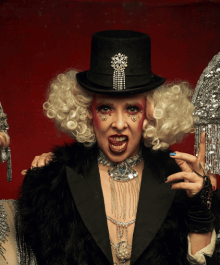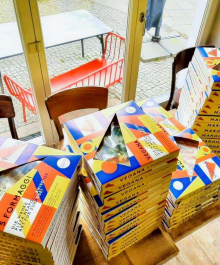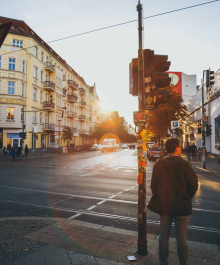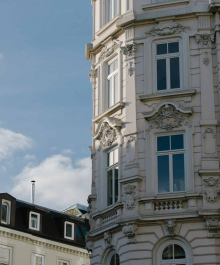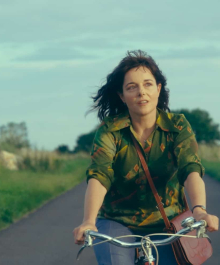
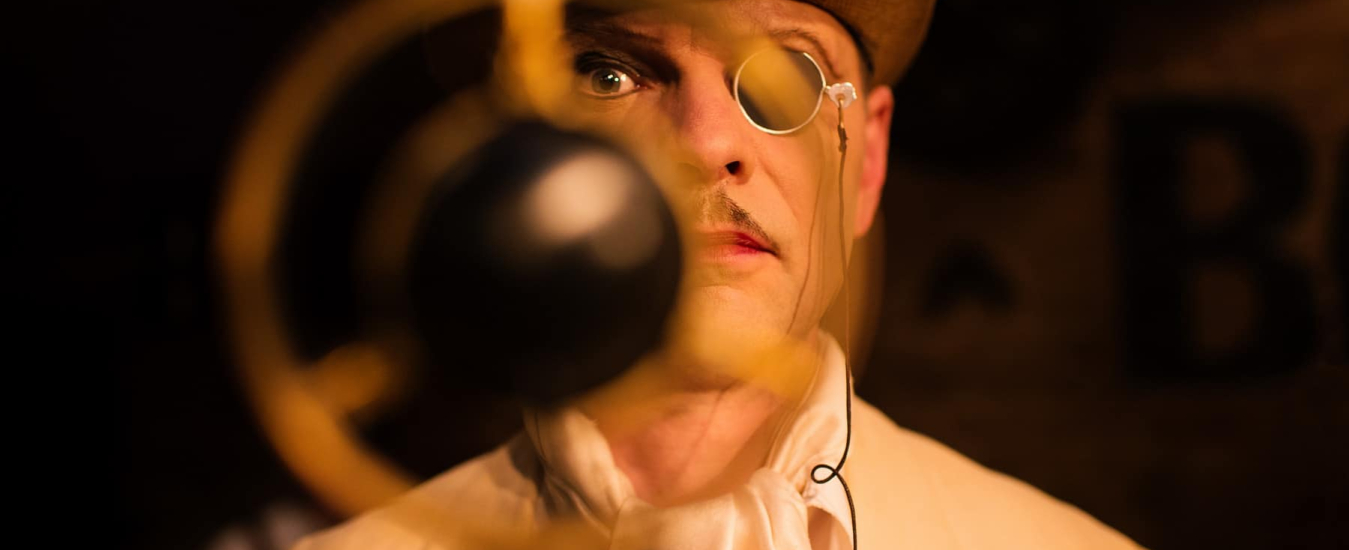
Daniel Malheur steps up on the stage, a dapper man in full vintage attire with a pencil mustache and painted lips. He approaches a gramophone and gives it a hearty cranking. As the scratchy strains of a bygone orchestra emits from the ancient machine, he stands in front of a vintage microphone and peers at the audience through a monocle. And then he sings.
With every rolled “r” of his Rudy Vallée tenor and each archly insinuated phrase, we are treated to a soundscape straight from die goldenen zwanziger Jahre. It’s one of the most unique varieté acts in Berlin: gramophone karaoke. But don’t expect cute songs about cactii on balconies or a lack of bananas. Malheur sings the caustic music of Berlin’s lost underground cabarets; songs that Anita Berber might have hummed while taking a bath. Naturally, he can regularly be seen at Bohéme Sauvage, but he also makes a point to perform at events where a 1920s tenor might not be so usual, like the enormous goth festival Wave-Gotik-Treffen in Leipzig. We caught up with the retro-futuristic performer before his next engagement at the Full Moon Cabaret.
The 1920s in Berlin — decadent, dark, wild, wicked. Have you always been attracted to this era?
In my youth, I collected 78rpms and I was a big fan of Hans Albers and Marlene Dietrich. So I started to look for German songs of the Weimar Era and realized that there are lots of treasures to be found with brilliant lyrics. I think I was touched by the kind of anarchy after the First World War. So many new ideas came out. It seems to me that it was a kind of new society. Very, very hard times for most of the people, but they were thankful that they survived the war. Now they had to go on in their lives – with nothing! That set free maybe new energy for new ideas and things…
Why do you think the 1920s is still relevant?
The 1920s were a time of high culture in Germany, especially in Berlin. Most of this culture was destroyed by the National Socialists. It took many decades to come back to a level near to what we had in the 1920s. It’s important to look back on that era and remember what we had so that we don’t make the same mistakes twice. The 1920s teaches us to use our brains and think for ourselves.
It seems to me that after the darkness of World War II and then the bleakness of the divided city, Berlin is only now recovered enough to start revisiting its 1920s heyday.
The 1920s is getting more and more popular as a theme and Berlin was, is, and will be, the main city of this theme. Now everybody is trying to jump on the train, which left the station in the beginning of the 2000s. I think there also will be a lot of “Golden Twenties” stuff in upcoming years since the new ’20s are near. And with all that, there also will be an underground scene with cabaret, burlesque, and strange performances that are maybe a bit more authentic, like in the 1920s…
You’re obviously a trained singer. What is your artistic background? What did you do before MonokelPop?
I started as a singer in a hard rock band in school. I wasn´t really a good singer at that time, more of a funny entertainer on stage. My mom proposed that I should take singing lessons and I thought it would be a good idea to be taught something about my voice. So I looked for classical singing lessons and I found an opera singer to give me voice education. After that, I got involved in lyrical songs and chansons. And the audience liked my 1920s-style performance, so MonokelPop was born.
You call yourself a “Salontenor”. Is this a particular style of singing in the 1920s?
A Salontenor used to perform in intimate settings, more cabaret than opera, and he´s not only a singer. He’s more of a kind of musical entertainer.
I’m sure your knowledge of the Weimar era in Berlin is far deeper than most of us. Is there a German singer or star whom you think everyone should know?
I’m greatly influenced by the gay cabaret singer Paul O`Montis, who was very popular in the end of the 1920s. He was a so-called “whispering tenor” with a funny but very smooth voice. A crazy character in a purple tailcoat. I like his sense of humour and his witty repertoire.
I find it fascinating that you sing to a gramophone. How did this act develop? And where on earth do you get those 78s?
My MonokelPop performances started in Hamburg when I did 78rpm parties with a shellac DJ friend. We went out to little bars and clubs with our record collection and two 1950s record players. At midnight, I would sing a few songs to the orchestral recordings. I found most of those in little record shops or at the fleamarket. Nowadays, I get them from collectors and shellac dealers.
You also sing with a full orchestra….?
I have a band called The Heaven And Hell Orchestra. Well, we call it an orchestra but it’s really a jazz band with piano, violin, double bass, drums, and voice. Our latest project is Mephistopolis, a concept album that purports to be the rediscovered songbook of British jazz musician Charles T. Goodhill, who enjoyed great success in 1920s Berlin before dying under mysterious circumstances. It is said he was the head of a secret cult, of which there were countless in Berlin at the time. Night after night, he led a willing audience into the back room of the Himmel & Hoelle Cabaret to celebrate black masses and beguile his followers with devilish tangos and weird foxtrots. These are actually milestones of heavy metal in a 1920s style. In this way, I’ve moved the roots of heavy metal into Berlin during the last years of the Weimar Republic. A MonokelPop slight-of-hand that I hope will be forgiven by the heroes of my youth.
What are your favorite vintage shops in Berlin?
To be honest, I have to say, I do not go to vintage shops. I find my clothes from the flea market or I get them from friends. But if I´m on tour to a small town, I try to go to flea markets since you can sometimes find really cool stuff. In Berlin I used to go to Mauerpark, but that’s changed a lot and there are not so many private tables as a few years ago. But I once found a great pair of old boots there.
For men, what do you think is essential to a 1920s look?
I think, it´s not so important what you wear. More how you wear things to transport the idea of the 1920s. Well, me, I wear the MonokelPop style!
More about Daniel Malheur can be found on his website, Facebook page or on Soundcloud.
Daniel Malheur will be performing at the Full Moon Cabaret this Wednesday, December 14th, at Freudenzimmer, Kreuzberg.
Daniel Malheur. Berlin Loves You.
